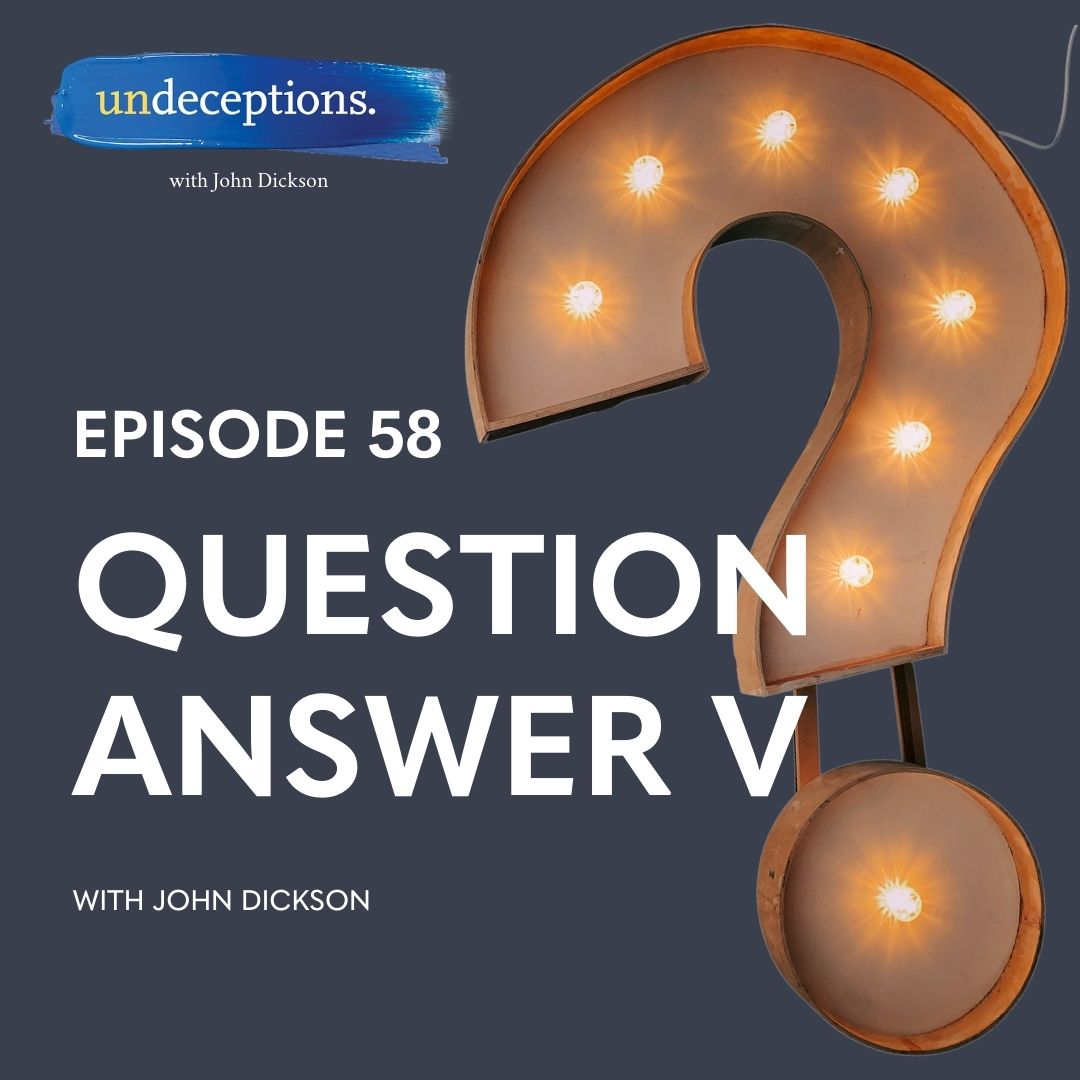
It’s Season 5’s Q&A episode – where you’ve called or written to us with the questions our recent episodes have raised for you, and John does his best to give you an answer — some of which are guaranteed to raise more questions. See how that works!?
This episode is sponsored by Zondervan’s new book Urban Apologetics by Eric Mason.
Questions and Links
Question 1: A question from Naomi: I‘ve just been struck by the really shocking violence and particularly the violence that’s ordered by God in fully wiping out full communities. At the same time, one of my teenagers has asked me about Bible violence and how our loving God could have done these things. I don’t think I’ve been able to give a satisfactory answer. Can you help?
Question 2: A question from Jonah:What’s with the so-called ‘Imprecatory Psalms’? I’m wondering how, when and if they should be used within the context of Christian worship – Psalms that speak language such as wanting to take a child’s head and dash it against a rock. What do we do with language like that?
Question 3: Noah asks, I’ve been reading through Deuteronomy recently and have a question about Deuteronomy 28:63. It’s written that, “Just as the Lord has found great pleasure in causing you to prosper and multiply, the Lord will find pleasure in destroying you.” (NLT). Not sure really how to ask my question, but basically – “wait, what?”.
Question 4: Edwin asks, I was recently listening to the episode on Religious Freedom from back in May, specifically the discussion around Tertullian’s and Jefferson’s assertion that “the religion of one person neither harms nor helps another.” It occurred to me that the precise opposite of that view is being claimed by many these days against the idea of religious freedom – that religious practice, even simply the presence of religious beliefs by one person, does indeed harm others. We hear it all the time from those in the LGBTI community – Christian beliefs allegedly lead to very real harm to some in our society. I know you’ve spoken before about how Christianity helps others; and you’ve talked about how harm has been done to others in some periods of history, such as the Crusades, but I wonder … does one person’s religion harm another?
Question 5: Paul asks, Just finished the episode on friendship, and a question that dropped out of that discussion is: Can a man and woman – not married – have the sort of friendship you were describing?
Question 6: Terry asks, If Christianity is built on the fundamental premise of the Trinity (Father, Son and Holy Spirit) and Jesus was not conceived by God, does that not challenge the beliefs of Christians? Can you still be a Christian and accept that Jesus was conceived naturally? How do you do this?
Question 7: We got an email from Rob asking us to do an episode on the similarity between some of the Old Testament stories and other stories in ancient cultures, like Noah’s Ark. So we made it into a question — though perhaps we WILL do a whole episode on this in the future!
Question 8: A question from a different John: I’m having wonderful discussion with my neighbour and we’re hitting a stale mate (in a nice way!). He cannot get past that he personally never had the choice/option to be in the Garden of Eden – you know, with Adam and Eve – and have the right to choose the fruit or not. He gets there is a choice now in Jesus. But, the context of his choice is within a pretty harsh and painful world … who knows what he may have chosen in a perfect world?
Question 9: Therese has a question coming from our Between Testaments episode, episode 54. In that episode, we made a few references to ‘the world’ – for example, when we said “The Babylonian empire dominated the world’. But Therese is wondering … isn’t that just the Middle East?
Does “the world” in this context mean just the world that was known to the authors of the historical documents we source history from? If that’s the case saying ‘the world’ sounds a little arrogant, as if the Middle East in this period was the only context where anything of importance actually happened.”
Therese is asking whether God was doing anything in history outside of the Middle East and surrounding countries. Why was the influence of the Old Testament just confined to one geographical region?
Question 10: Pui’s question is about John’s interview with Rebecca McLaughlin for episode 18 called “Confronting Christianity.”
McLaughlin claims that the West owes Christianity for its moral framework, and that atheists borrow from the Christian framework as they do not have a basis upon which to build one. She also claims that modern day science is a product of Christianity because of the Christians belief that the universe is orderly and can be studied, having been created by God who sets out the laws for nature.
My question is: How do you explain the existence of a moral framework such as that espoused by Confucius in ancient China, and the astronomical and other scientific achievements of the ancient Chinese scholars, when clearly Christianity had not had an impact at the time?
Question 11: One of our younger listeners, Georgia, asked: Why do we call it ‘The Bible’?
Question 12: Nina (age 7) asked: Is Jesus real? And what if he’s not?
Question 13: How do we explain the brokenness of the world before humans existed (you know, like the death of neanderthals; animal extinction; earthquakes and other natural disasters)?
Question 14: Black Widow, Harry Potter, Neo from The Matrix, Harry Stamper from Armageddon … As a Christian, when characters in movies sacrifice themselves for the greater good, or survival of mankind, I think of Jesus’ sacrifice on the cross. But did this “concept” originate from Christianity? Are there examples of this in earlier religions or mythology?
Want to send John Dickson a question? He loves them. Just click here to provide a query for our next Q and A show!
Undeceptions is part of the Undeceptions Network. Seeking to ‘undeceive ourselves’, and let the truth ‘out’.











































